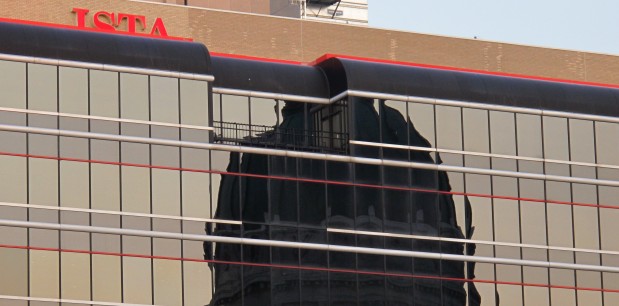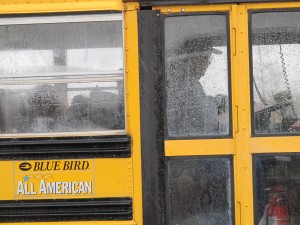Is Indiana's Right To Work Bill An Education Issue?

Kyle Stokes / StateImpact Indiana
The statehouse's reflection shines in the windows of the building housing the Indiana State Teachers Association, the state's largest teachers union.
Don’t make the mistake of thinking a shortened ten-week session signals an “off-year” for Indiana’s General Assembly, says veteran statehouse lobbyist Libby Cierzniak.
“It’s a sprint that will feel like a marathon,” says Cierzniak — and already-controversial “right-to-work” legislation could make that sprint all the more strenuous.
Most legislative observers believe the issue of whether workers can be forced to join a union will dominate the session. But opinions diverge on whether the right-to-work bill would actually affect Indiana teachers and schools — or if it would simply crowd out other educationally-relevant issues.
- Will Right To Work Crowd Out Education Legislation?Some Indiana school districts want relief from the state legislature from a property tax cap they say is costing them millions of dollars. But as StateImpact Indiana‘s Kyle Stokes reports, education issues like the tax cap could end up taking a back seat to the right to work bill.Download
“If there is a big brouhaha over right to work, that may cause some of the educational issues to take a back seat,” says David Dresslar, executive director of the Center of Excellence in Leadership of Learning.
What issues? For starters, changes to the property tax cap might end up on the back burner, Dresslar and Cierzniak say — changes many districts have sorely desired.
‘There Isn’t Anything Left To Cut’

Kyle Stokes / StateImpact Indiana
Mount Vernon Community School bus driver Dan Henighan waits to pick up students from an elementary school outside Fortville.
Indiana school districts have lost a total of $205 million in property tax revenues to the statewide caps.
Most of the losses are concentrated in 48 districts who’ve seen more than 10 percent of their tax revenues disappear because of the property tax caps. In districts like Anderson and Vincennes, property tax revenues have dropped between 20 and 30 percent.
Among those districts is Mount Vernon Community Schools in Fortville. The district is considering forcing families to pay for busing. A similar budget cut already implemented by Franklin Township schools led to a lawsuit against that district, but Mount Vernon superintendent Bill Riggs says the district has no other choice.
“There really isn’t anything left to cut,” Riggs told StateImpact, adding other district funds directly tied to property tax revenues have taken hits too. Mount Vernon could cut its budget for emergency building repairs, but Riggs says that option isn’t really on the table. What Riggs is truly hoping for is a fix from the General Assembly.
“I just hope the upcoming session doesn’t get caught up in the right-to-work legislation and some of these other important issues get lost,” Riggs says. “These are things that affect people on a daily basis as well, and they need to be addressed. I’m hoping the General Assembly makes room for them.”
Riggs delivered that message directly to several legislative leaders at a breakfast last month, including Republican House Speaker Brian Bosma. The Indiana Economic Digest spoke to Bosma at the breakfast:
“I’ve seen my share of good times and tough times. I’ve seen the gamut,” said Bosma, R-Indianapolis. “For some, it’s the perfect storm”…
Bosma responded that several discussions had already taken place with the administration at Mt. Vernon to work out a remedy for the situation, and he pointed out that the school district is not alone. One relief mechanism being put together would allow for a means of financing a school’s debt over a much longer term.
Right To Work’s (In)direct Effect?
But saying right to work will crowd out other education issues precludes the notion that right to work itself could be an education issue.
Lobbyist Libby Cierzniak, a partner at Baker & Daniels who represents Indianapolis Public Schools, says right to work doesn’t have a direct impact on teachers, who effectively have been right to work since 1995.
That hasn’t stopped the Indiana State Teachers Association — the state’s largest teachers union — from opposing the new right to work bill.
Gail Zeheralis, the ISTA’s director of government relations, says right to work does indirectly affect education. The ISTA believes right to work tends to lead to lower wages, Zeheralis says, which in turn lowers tax revenues, potentially leading to lower levels of state funding for education.
But beyond the potential for an economic domino effect, Zeheralis says the ISTA also opposes the right-to-work bill on principle.
“From a purely education standpoint, [right to work] certainly does impact. But even beyond that, it’s an issue of the respect for the collective voice of employees,” Zeheralis says.
In brief, Cierzniak and Dresslar say there are other education issues that are likely to pass the General Assembly this year. Lawmakers will likely take up state education officials’ sped-up timeline for intervention in failing schools. Cierzniak says they’ll probably pass a change to how students are counted for the purpose of divvying state funding to schools.
Procedurally, observers say how much right to work puts a halt to other education issues could simply depend on how long the bill would tie up business on the floor. But with Democrats already hinting the bill could force a walkout, any delay could make the General Assembly’s short session could feel even shorter.
Podcast: Play in new window | Download
